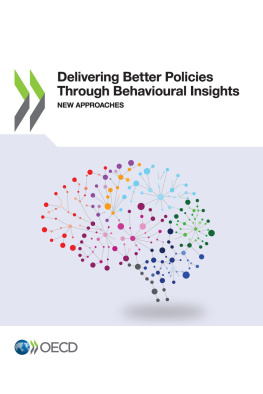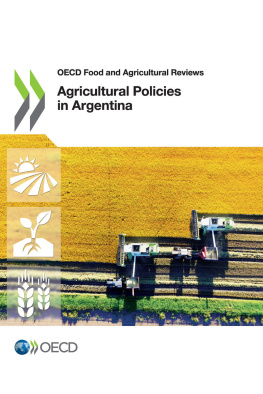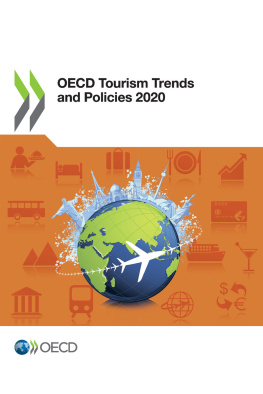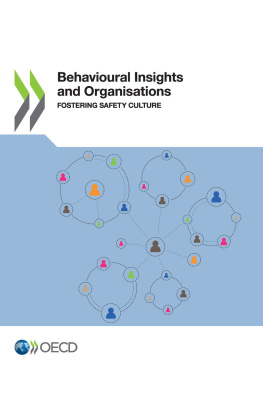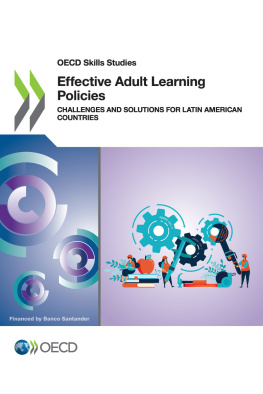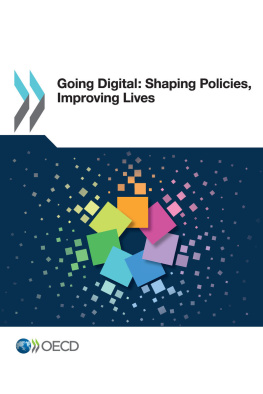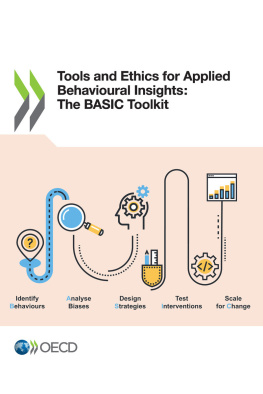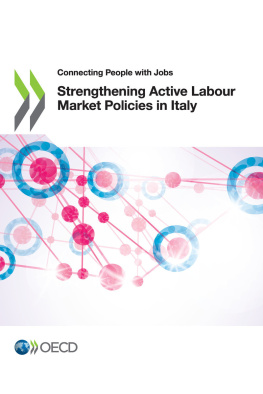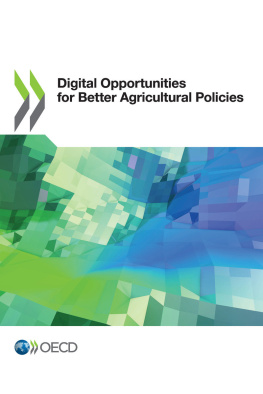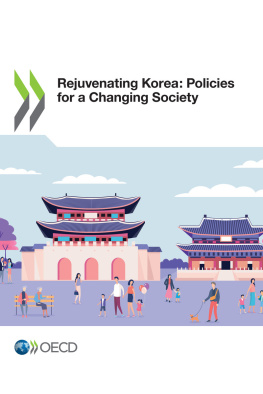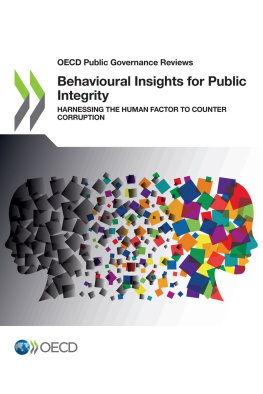OECD - Delivering Better Policies Through Behavioural Insights
Here you can read online OECD - Delivering Better Policies Through Behavioural Insights full text of the book (entire story) in english for free. Download pdf and epub, get meaning, cover and reviews about this ebook. year: 2019, publisher: OECD Publishing, genre: Romance novel. Description of the work, (preface) as well as reviews are available. Best literature library LitArk.com created for fans of good reading and offers a wide selection of genres:
Romance novel
Science fiction
Adventure
Detective
Science
History
Home and family
Prose
Art
Politics
Computer
Non-fiction
Religion
Business
Children
Humor
Choose a favorite category and find really read worthwhile books. Enjoy immersion in the world of imagination, feel the emotions of the characters or learn something new for yourself, make an fascinating discovery.
- Book:Delivering Better Policies Through Behavioural Insights
- Author:
- Publisher:OECD Publishing
- Genre:
- Year:2019
- Rating:4 / 5
- Favourites:Add to favourites
- Your mark:
- 80
- 1
- 2
- 3
- 4
- 5
Delivering Better Policies Through Behavioural Insights: summary, description and annotation
We offer to read an annotation, description, summary or preface (depends on what the author of the book "Delivering Better Policies Through Behavioural Insights" wrote himself). If you haven't found the necessary information about the book — write in the comments, we will try to find it.
OECD: author's other books
Who wrote Delivering Better Policies Through Behavioural Insights? Find out the surname, the name of the author of the book and a list of all author's works by series.
Delivering Better Policies Through Behavioural Insights — read online for free the complete book (whole text) full work
Below is the text of the book, divided by pages. System saving the place of the last page read, allows you to conveniently read the book "Delivering Better Policies Through Behavioural Insights" online for free, without having to search again every time where you left off. Put a bookmark, and you can go to the page where you finished reading at any time.
Font size:
Interval:
Bookmark:
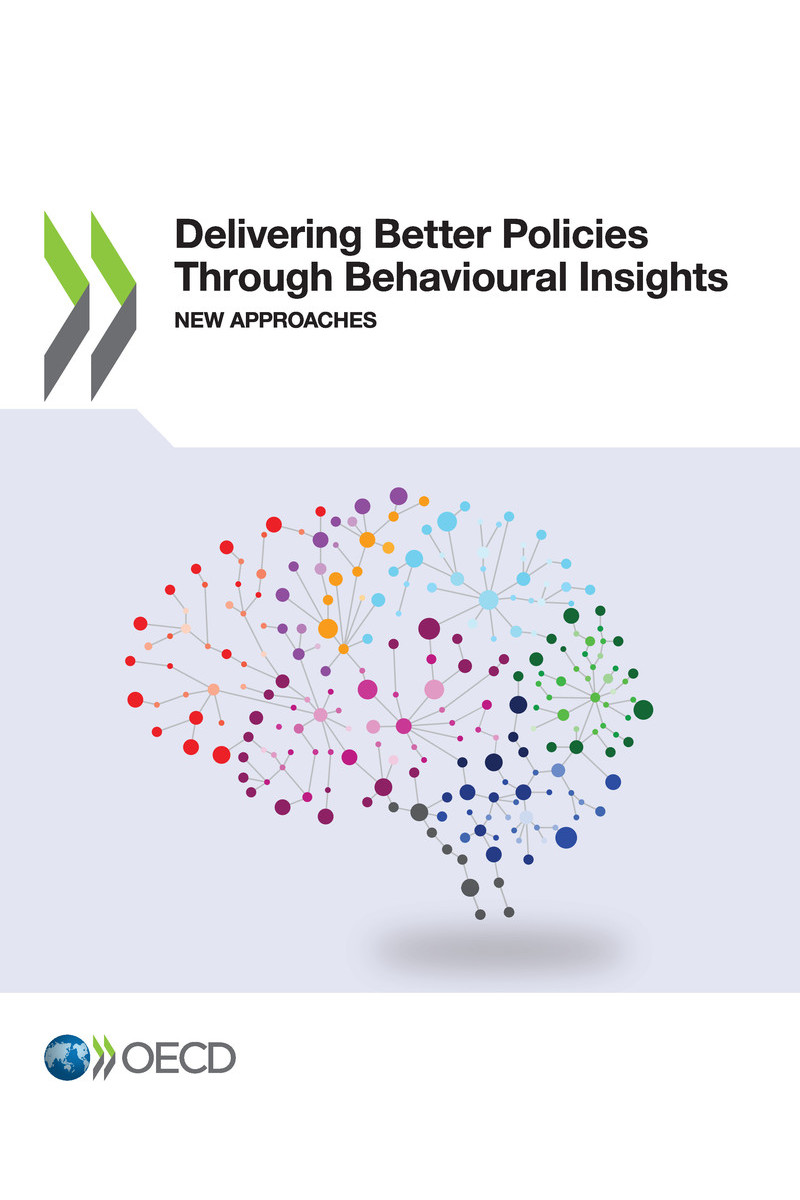
OECD (2019), Delivering Better Policies Through Behavioural Insights: New Approaches , OECD Publishing, Paris.
https://doi.org/10.1787/6c9291e2-en
Behavioural insights (BI) has greatly expanded our understanding of how the psychological, social and cultural factors governing human behaviour affect policy outcomes. Governments increasingly recognise the value of BI: OECD research has mapped over 200 government units, initiatives and partnerships across the world applying BI to public policy. As BI has become more prevalent, countries are using it to address new and more complex policy problems.
The OECD has been at the forefront of documenting and researching the use of BI in public policy in general and in policy fields such as consumer protection, environment, financial education, firm behaviour, public sector integrity, obesity, regulatory policy and taxation. This report builds on this work by tackling new problems related to individual behaviour as well as organisational behaviour.
This work brings together four OECD Directorates Environment; Financial and Enterprise Affairs; Public Governance; and Science, Technology and Innovation to test behaviourally informed solutions to complex policy problems in the fields of energy consumption, competition, safety and consumer protection respectively. It uses a variety of methods, including literature reviews and modelling to expand the theoretical basis for applying BI to policy problems. Where feasible, these solutions were tested using various experimental methods. Research institutions and leading experts across the world also participated in the development of this report.
The report highlights promising results in applying BI to complex policy problems as well as areas for further research and action. For example, it discusses ways to improve individual behaviour with regard to energy consumption, as well as an experimental approach to examining online advertising, disclosure agreements and personalised pricing. In terms of changing the behaviour of organisations, the report looks at ways to deter cartels through antitrust regimes and foster a culture of safety in the energy sector.
The report also identifies some broader lessons for using BI, such as the importance of scoping the policy problem, studying ways to change organisational behaviour, encouraging cross-national and cross-cultural experimentation, using a variety of tools and experimental methods and translating results so that policymakers can implement the findings at scale. It is also important to include BI in every stage of the policy cycle to maximise the potential impacts to policy outcomes. Behavioural practitioners and policymakers must also adhere to ethical standards to ensure they are applying BI responsibly.
This report is the product of a joint effort across the Organisation for Economic Co-operation and Development (OECD), bringing together contributions from the OECD Directorates for Environment (ENV), Financial and Enterprise Affairs (DAF), Public Governance (GOV), and Science, Technology and Innovation (STI). This report and the work underlying the analysis would not have been possible without the support of the OECD Central Priority Fund managed by the Office of the Secretary-General.
The overall report was prepared by Francesca Papa, James Drummond and Jun Nakagawa with co-ordination and input from Filippo Cavassini and Anna Pietikainen. Work underlying the report was led by Filippo Cavassini and Faisal Naru and received the encouragement and support of Marcos Bonturi, Director, Irne Hors, Deputy Director, and Nick Malyshev, Head of the Regulatory Policy Division, Public Governance Directorate. Peer review comments to the overall report were provided by Martin Forst and Alessandro Bellantoni, Head and Deputy Head of the Governance Reviews and Partnership Division, and Edwin Lau, Head of the Budgeting and Public Expenditures Division, Public Governance Directorate. Input and comments on the overall report were provided by Walid Oueslati (ENV), Chris Pike (DAF) and Michael Donohue (STI). Eleonore Morena edited the report and Jennifer Stein co-ordinated the editorial process, with editorial support provided by Andrea Uhrhammer and Meral Gedik.
Each chapter was prepared and reviewed by dedicated teams whose work the Secretariat would like to acknowledge:
Chapter 2: Real-time information and consumer decisions on energy consumption was prepared by Dr Nicholas Rivers, University of Ottawa, with input and support from Elisabetta Cornago, Alexandros Dimitropoulos and Walid Oueslati, Environment and Economy Integration Division, ENV. The work underlying the chapter was discussed in the OECD Environmental Policy Committee in February 2018.
Chapter 3: Protecting digital consumers was prepared by Richard Bates, with input and support from Anna Barker and Michael Donohue, Division for Digital Economy Policy, STI. The work underlying the chapter was discussed in the OECD Committee on Consumer Policy in November 2018.
Chapter 4: Cartel deterrence and the labour market for managers was prepared by Dr Ricardo Gonalves, Catlica Porto Business School, Dr Miguel A. Fonseca, University of Exeter Business School, Dr Joana Pinho, Catlica Porto Business School, and Dr Giovanni Tabacco, Swansea University, with input and support from Sean Ennis and Chris Pike, Competition Division, DAF. The work underlying the chapter was circulated in the OECD Competition Committee in December 2018.
Chapter 5: Fostering a safety culture in the energy sector was prepared by Mary MacLennan, behavioural science consultant and former member of the Impact and Innovation Unit, Canada, supported by Dr Tom Reader, London School of Economics, and Dr Morgan Tear, Research Fellow, London School of Economics and BehaviourWorks Australia at Monash University, with input and support from Filippo Cavassini, Shelly Hsieh and Anna Pietikainen, GOV. Comments were provided on the country analysis by Claudine Bradley, Melissa Mathieson and Peter Watson, National Energy Board (NEB), Canada; Ann McGarry and Ashleigh Shaheen, the Commission for Regulation of Utilities (CRU), Ireland; Daniela Martnez Ramrez, Patricia Angelica Quiles Martinez and Fernanda Garcia Rodriguez, Agency for Safety, Energy and Environment ( Agencia de Seguridad, Energa y Ambiente , ASEA), Mexico; and Qais Al Zakwani, Authority for Electricity Regulation (AER), Oman. The work underlying the chapter was discussed in the OECD Network of Economic Regulators in November 2018.
Font size:
Interval:
Bookmark:
Similar books «Delivering Better Policies Through Behavioural Insights»
Look at similar books to Delivering Better Policies Through Behavioural Insights. We have selected literature similar in name and meaning in the hope of providing readers with more options to find new, interesting, not yet read works.
Discussion, reviews of the book Delivering Better Policies Through Behavioural Insights and just readers' own opinions. Leave your comments, write what you think about the work, its meaning or the main characters. Specify what exactly you liked and what you didn't like, and why you think so.

